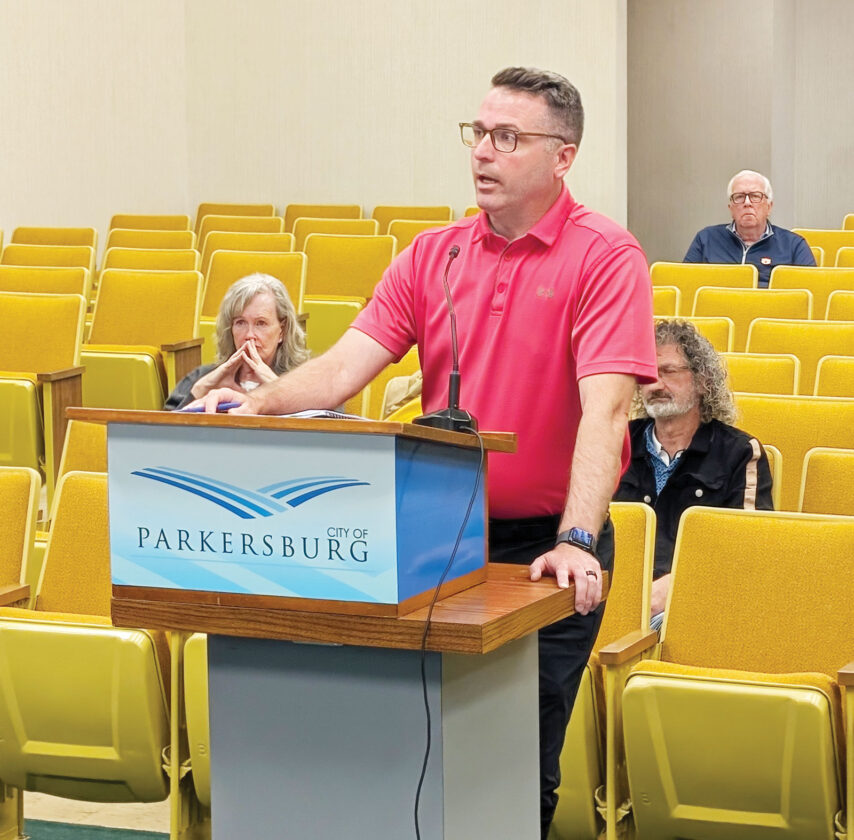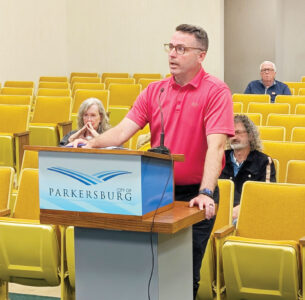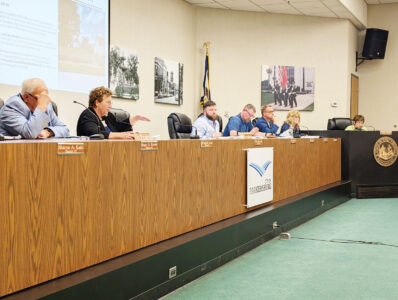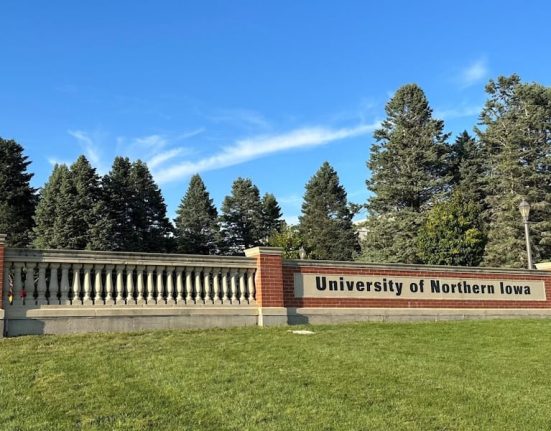- Parkersburg Development Director Ryan Barber outlines a proposal to raise the limit for property acquisitions by administrative staff without prior Urban Renewal Authority approval from $2,000 to $5,000 during a URA meeting on May 27 at the Municipal Building. (Photo by Evan Bevins)
- Parkersburg City Councilwoman Wendy Tuck, second from left, asks a question during a May 27 Urban Renewal Authority meeting in council chambers at the Municipal Building. Also pictured are, from left, Councilmen Roger Brown, Zak Huffman, Chris Rexroad and Andrew Borkowski, Councilwoman Cathy Dailey and City Clerk Connie Shaffer. (Photo by Evan Bevins)
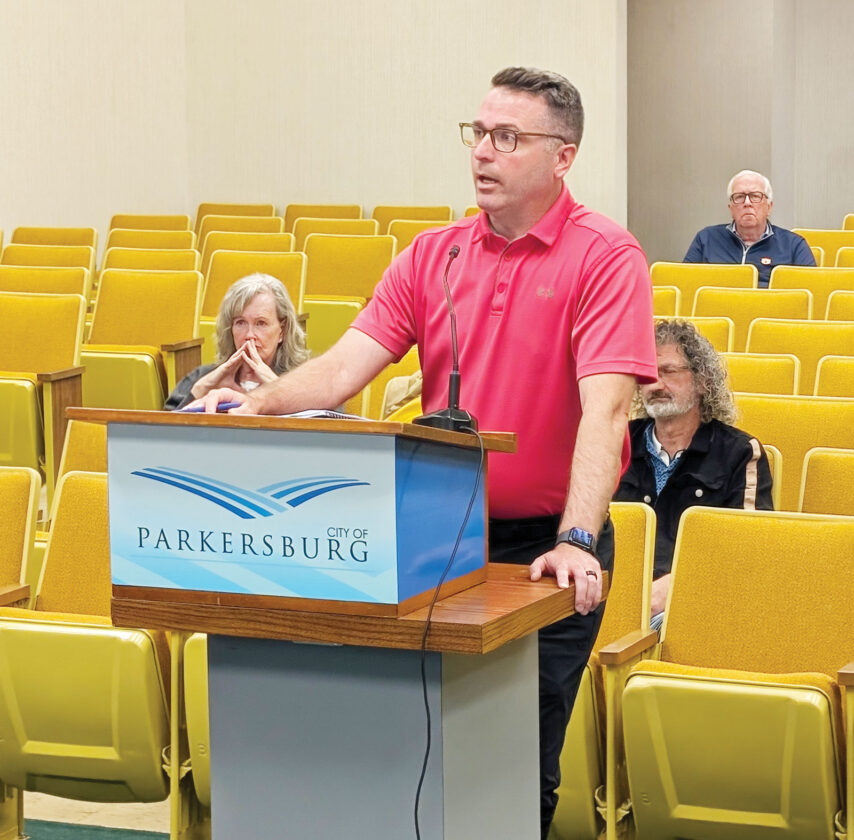
Parkersburg Development Director Ryan Barber outlines a proposal to raise the limit for property acquisitions by administrative staff without prior Urban Renewal Authority approval from $2,000 to $5,000 during a URA meeting on May 27 at the Municipal Building. (Photo by Evan Bevins)
PARKERSBURG — The Parkersburg Urban Renewal Authority’s property catalog could more than double in the next year or so, thanks to a change in rules City Council members recently voted to amend again.
The city could obtain as many as 35 tax deeds for parcels that they exercised a right of first refusal in order to purchase in July at a state tax sale. And at this year’s tax sale in April, the city exercised its right of first refusal on 40 more properties, but it won’t be determined until 2026 whether the city takes ownership.
“Almost exclusively, these are vacant parcels that the city has already taken action on, primarily through demolition, or properties that we are already mowing,” Development Director Ryan Barber said.
The acquisitions are due primarily to a 2022 resolution approved by the URA, which consists of all nine council members, allowing the administrative staff to acquire property for $2,000 or less without prior approval by the authority.
During a May 27 URA meeting, members voted 7-0, with Councilman Dave McCrady and Council President Mike Reynolds absent, to increase the limit to $5,000.
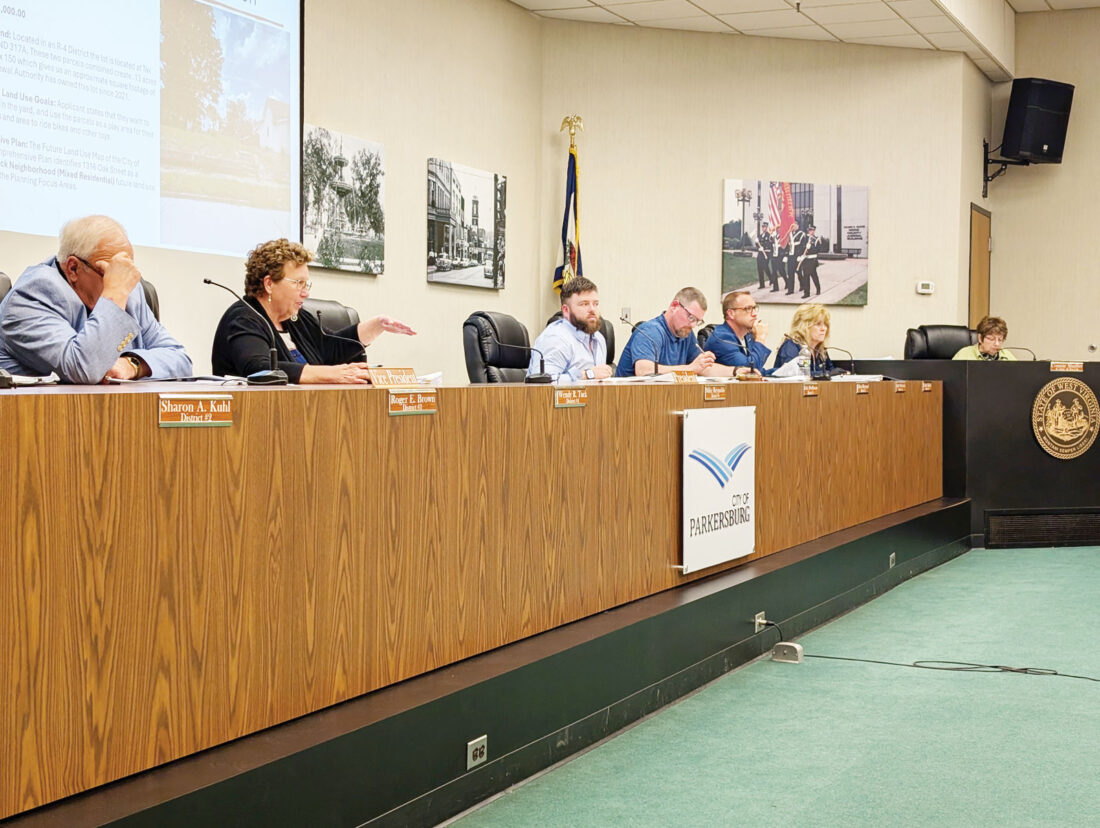
Parkersburg City Councilwoman Wendy Tuck, second from left, asks a question during a May 27 Urban Renewal Authority meeting in council chambers at the Municipal Building. Also pictured are, from left, Councilmen Roger Brown, Zak Huffman, Chris Rexroad and Andrew Borkowski, Councilwoman Cathy Dailey and City Clerk Connie Shaffer. (Photo by Evan Bevins)
State law gives agencies like urban renewal authorities and land banks a right of first refusal on tax-delinquent properties.
When the administration receives a list of properties expected to be up for bid in a tax sale, officials can perform due diligence to see if the city has a financial interest in them, such as a demolition lien or judgment, Barber said. If the administration decides to acquire the property, the city pays the taxes and the property is not part of the sale, he said.
For the July 2024 tax sale, the city exercised its right of first refusal on 42 properties at an average cost of $687, Barber told council members at the May 27 URA meeting.
But the city doesn’t get ownership of the parcels right away. Other entities with interest in them – including the property owner, the sheriff’s office, a mortgage company or the IRS – can opt to redeem the taxes, leaving the property in the hands of the owner and judgments in place, Barber said.
Of the 42 properties the city paid the taxes for in 2024, seven have been redeemed, he said.
“It’s roughly a nine- to 12-month process,” Barber said, noting there must be ample time for other parties to be notified.
But that window for the 2024 properties is closing soon. Barring any 11th-hour redemptions, the URA is set to add 35 parcels to its catalog, which now has about 50 properties.
“It will likely get much, much larger in three months and then a year from now,” Barber said at the May 27 meeting.
Ahead of the April tax sale this year, the city exercised its right of first refusal on another 40 properties, Barber said.
Councilwoman Wendy Tuck asked at the May 27 meeting whether there was a lot of competition for the properties the city is attempting to acquire. Barber said they don’t actually go out for bid if the city takes action, but of those that do go through the sale process, “a large percentage of them go unbid, uncollected.”
In response to questions from council members, Barber said they could set an overall limit on how much could be spent acquiring property in this manner or add a sunset clause so the policy could be revisited in the future. Tuck made a motion to add a sunset clause in three years but it died for lack of a second.
Members then voted to approve the recommendation of increasing the limit to $5,000 for individual property acquisitions.
In an interview later in the week, Barber said the goal is not to acquire as much property as possible but to take property that might be difficult to purchase because of multiple judgments or interest and “put it back into use by offering it up to the community.
“It will provide some additional flexibility from the administration to be strategic in its acquisitions and blight mitigation,” he said.
At the meeting, Code Enforcement Director Andy Nestor noted that, although the acquisitions primarily deal with properties headed to tax sales, there have been instances where a deal is worked out with an individual property owner. Fees owed to the city can be deducted from the purchase price, as long as the price before the deduction is below the limit set by the URA, Nestor said.
Evan Bevins can be reached at ebevins@newsandsentinel.com.

